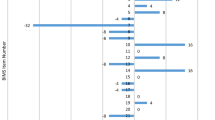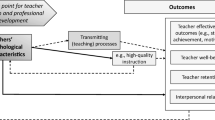Abstract
Six mini case studies of teachers certified by the National Board of Professional Teaching Standards (NBPTS) were completed using systematic classroom observations, individual teacher interviews, and semi-structured individual and focus group interviews with school site administrators and colleague teachers. Classroom teaching practices of six teachers (2 elementary, 2 middle/Jr. High, 2 High School) in a large southeastern urban district were assessed by two trained observers, and semi-structured interviews with school-site personnel were completed by two additional trained researchers. The findings clearly showed considerable variation among these teachers in the quality of teaching and learning in their daily practices. Two teachers were clearly exemplary, two were rather average, and two were considered rather ineffective in the quality of classroom teaching and learning. Interviews with school-site personnel were somewhat mixed in corroborating findings from actual classroom observations and assessments. Implications of the findings for the validity of NBPTS certification in everyday practice, the meaning of NBPTS certification, and policy decisions such as performance-based pay supplements for NBPTS certified teachers are discussed.
Similar content being viewed by others
References
Berliner, D. (1988, Feb). The Development of Expertise in Pedagogy. Paper presented at the annual meeting of the American Educational Research Association, Washington, D.C.
Bond, L., Smith, T., Baker, W., &; Hattie, J. (2000). The Certification System of the National Board for Professional Teaching Standards: A Construct and Consequential Validity Study. Center for Educational Research and Evaluation, University of North Carolina at Greensboro.
Brophy, J. (1983). Classroom Organization and Management. Elementary School Journal, 83(4), 265-285.
Cuban, L. (1990). Reforming Again, Again, and Again. Educational Researcher, 19(1), 3-13.
Darling-Hammond, L. (2000). Solving the Dilemmas of Teacher Supply, Demand, and Standards: How Can We Ensure a Competent, Caring, and Qualified Teacher for Every Child? New York: National Commission on Teaching and America's Future.
Ellett, C.D. (2000). Professional Assessment and Comprehensive Evaluation System: PACES. Baton Rouge, LA: CDE Research Associates, Inc.
Ellett, C.D., Loup, K.S., Evans, L., Chauvin, S.W., &; Naik, N. (1994). A Study of Teacher Nominations of Superior Colleagues: Implications for Teacher Evaluation Programs and the Construct-Validity of Classroom-Based Assessments of Teaching and Learning. Journal of Personnel Evaluation in Education, 8(1), 7-28.
Goldhaber, D.D., &; Brewer, D.J. (2000). Does Teacher Certification Matter? High School Teacher Certification Status and Student Achievement. Educational Evaluation and Policy Analysis, 22(2), 129-146.
Johnson, S.M. (2001). Can Professional Certification for Teachers Reshape Teaching as a Career? Phi Delta Kappan, 393-399.
National Board of Professional Teaching Standards. (11-30-00). About the National Board. [on-line] Available: www.nbpts.org
Patton, M.Q. (1990). Qualitative Evaluation and Research Methods. Thousand Oaks, CA: Sage.
Sanders, W., &; Rivers, J. (1998). Cumulative and Residual Effects of Teachers on Future Academic Achievement. In Education Trust. Thinking K-16: Good Teaching Matters: How Well Qualified Teachers Can Close the Gap.
Sparks-Langer, G., Simmons, J., Pasch, M., Colton, A., &; Starko, A. (1990). Reflective Pedagogical Thinking: How Can We Promote it and Measure it? Journal of Teacher Education, 41(4), 23-32.
Wenglinsky, H. (2000). Teaching the Teachers: Different Settings, Different Results. (Policy Information Center), Princeton, NJ: Educational Testing Service.
Author information
Authors and Affiliations
Rights and permissions
About this article
Cite this article
Pool, J.E., Ellett, C.D., Schiavone, S. et al. How Valid are the National Board of Professional Teaching Standards Assessments for Predicting the Quality of Actual Classroom Teaching and Learning? Results of Six Mini Case Studies. Journal of Personnel Evaluation in Education 15, 31–48 (2001). https://doi.org/10.1023/A:1011152101776
Issue Date:
DOI: https://doi.org/10.1023/A:1011152101776




